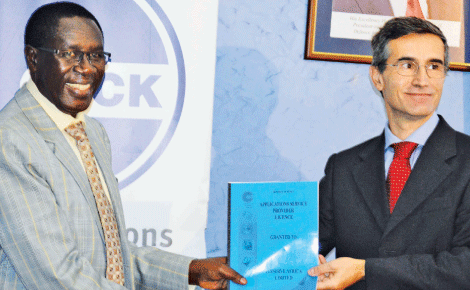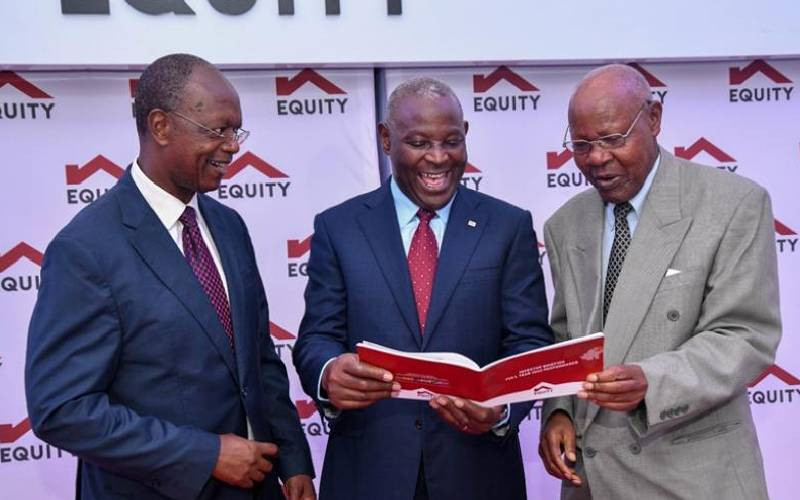 |
|
CCK Director General Francis Wangusi presents MVNO licence to Mr Enrico Nora, General Manager, Mobile Banking Finserve Africa Limited, a subsidiary of Equity Bank. [PHOTO: COURTESY/STANDARD] |
By Winsley Masese
Nairobi, Kenya: Equity Bank can now take on mobile phone operators in the fight for a slice of the lucrative telecoms business. The bank, the largest lender in customer numbers has always hoped to go big on mobile phone banking to deliver financial services to its eight million account holders.
The bank, through its subsidiary Finserve Africa Limited, and two other companies, Zioncell Kenya Limited and Mobile Pay Limited, were yesterday awarded the Mobile Virtual Network Operator (MVNO) licences. Zioncell Kenya is owned by Mobile Decisioning (MoDe) while Mobile Pay Limited runs the Tangaza mobile money transfer service.
Equity, Tangaza and MoDe can now piggyback on existing infrastructure such as that of Airtel, Safaricom or Orange to launch their mobile products. They can have their own SIM cards, with subscribers able to make calls. They can also enter the data market—said to be low hanging fruit waiting to be tapped.
The companies will be counting on their existing customer bases to compete in the country’s telecom market. The MVNOs can be used to offer differentiated services to a segment of the market. These firms have spotted a gap in the market and hope to use that to create a business case for the MVNO service to offer special telecom services to their existing customers and grow their revenues.
The common denominator in all these organisations is the primary desire to pursue the mobile money services segment. “One of the motivations of licensing more MVNOs is to open up space for the various market segments for competition such as in mobile money transfer,” the Communications Commission of Kenya (CCK) Director General Francis Wangusi said.
Niche market
The development is also expected to spur innovation in the mobile sector and as a consequence play part in improving the country’s growth prospects.
“Licensing is giving them a competitive advantage even for those already in the market providing various services to be innovative,” said Wangusi.
Airtel will host the three companies under the Application Service Provider, in efforts to share infrastructure, which is a constitutional obligation.
MVNOs, he argued, tend to use the available space they have been given in a much more effective way to carry more channels as the only way to make profit.
However, Wangusi warned the MVNOs that they have to deliver high quality service, saying that regulator will be monitoring the quality of service offered.
Wangusi said CCK would develop new regulations by end of June with the first set of drafts to be out by September in a bid to align them with the new laws.
Currently, there are a set of fourteen regulations that cover issues on spectrum utilisation, broadcasting, and quality of services. The new regulations will touch on voice, data and other parameters.
“We are not going to micro-manage the beneficiaries as their survival depends on their creativity and their approach to compete with others in a competitive environment. The MVNOs have a full range of services to provide but can create their own niche market they want to specialise in and that is up to them.”
Stay informed. Subscribe to our newsletter
Tangaza Pesa Chairman, Oscar Ikinu, said that they would now venture into voice, Internet, short text messages and mobile money to expand into the market.
“We want to deliver a lot of value to our customers who only use the phone to send money and now they can access a number of applications,” he said.
The company has already produced new sim cards, which it hopes to produce to the market soon.
Julian Kyula, the chief executive officer, MoDe, which will operate Zioncell noted that there is still a very good spectrum of value to deliver to Kenyans. “Kenyans and groups such as churches, the youth and farmers look for customised solutions which can be delivered by small companies and this is where we come in,” he said.
Kyula said that their innovation teams and programmers will put all the applications in the sim cards in order to serve the unique needs of a particular group.
“By customising the services, users can access the name of the society and not the company’s name besides the applications different users will need in their localities.”
Over the past few years, Equity Bank has tried to penetrate this market through the rollout of ICT value-added services.
Cashless
It made a significant leap to venture into the telecoms mobile money space with M-Kesho. The venture was largely unsuccessful due to complications in revenue sharing and business models between it and Safaricom.
The bank has also signed a number of agreements with Visa, PayPal and MasterCard to become dominant players in the growing electronics payment space.
MasterCard and Equity’s offering allows users to carry out cashless transactions on their mobile handsets through mobile points of sale (POS).
Wangusi asked mobile network operators to devise frameworks to enable them share infrastructure and utilise the scarce spectrum efficiently.
He said sharing infrastructure is one way to ensure that the resources such as the spectrum is utilised meaningfully to spur innovation.
 The Standard Group Plc is a
multi-media organization with investments in media platforms spanning newspaper
print operations, television, radio broadcasting, digital and online services. The
Standard Group is recognized as a leading multi-media house in Kenya with a key
influence in matters of national and international interest.
The Standard Group Plc is a
multi-media organization with investments in media platforms spanning newspaper
print operations, television, radio broadcasting, digital and online services. The
Standard Group is recognized as a leading multi-media house in Kenya with a key
influence in matters of national and international interest.
 The Standard Group Plc is a
multi-media organization with investments in media platforms spanning newspaper
print operations, television, radio broadcasting, digital and online services. The
Standard Group is recognized as a leading multi-media house in Kenya with a key
influence in matters of national and international interest.
The Standard Group Plc is a
multi-media organization with investments in media platforms spanning newspaper
print operations, television, radio broadcasting, digital and online services. The
Standard Group is recognized as a leading multi-media house in Kenya with a key
influence in matters of national and international interest.









